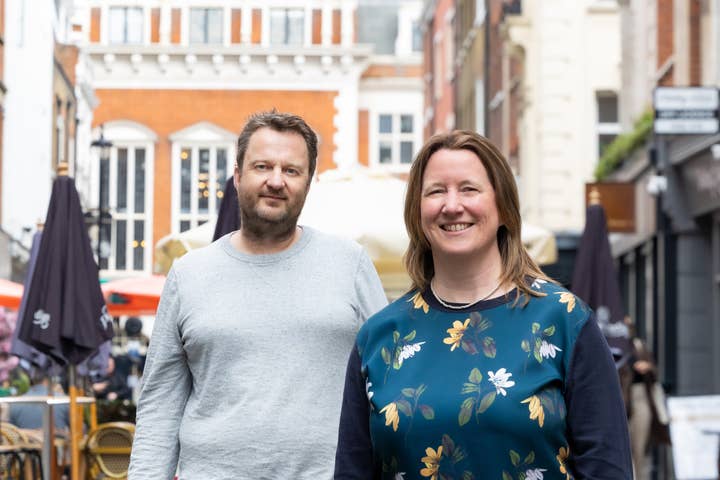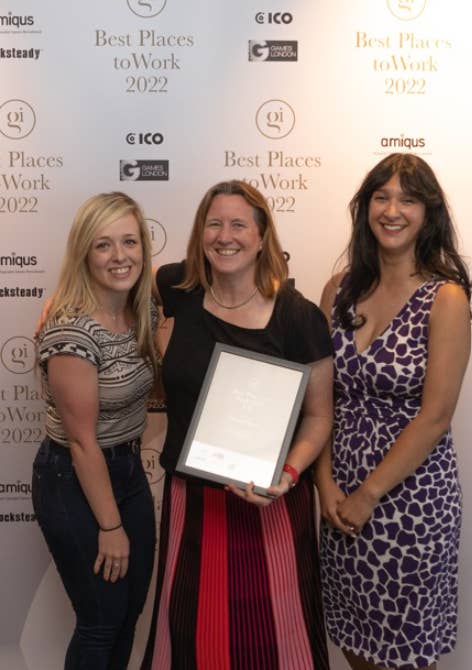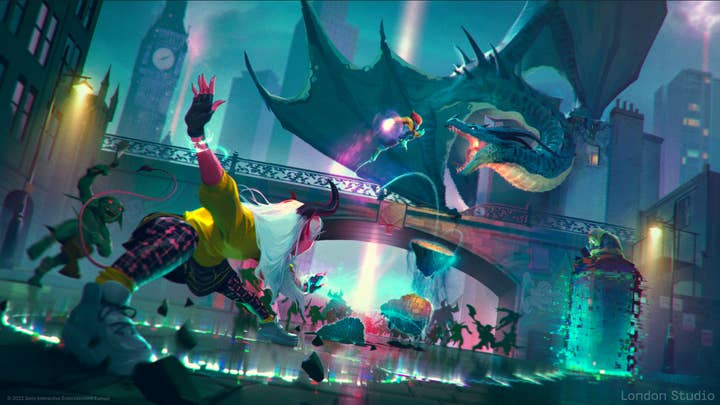Why PlayStation London Studio is leaving VR to create a fantasy online combat game
The Best Places To Work Award winner discusses the company’s latest transformation on its 20th anniversary
PlayStation's London Studio has always been one of Sony's most experimental teams
From SingStar to EyeToy, Wonderbook to PlayStation Home, and most recently VR, London Studio has a reputation for working with and often defining new technologies.
Not all those projects succeeded, but the ones that did would go on to inspire the entire industry.
Today, London Studio has announced its next game: a currently untitled online co-op combat game set in a fantasy London. There's no plastic microphone or VR headset in sight. It's certainly unique for the company, but it's hardly the leap into the unknown that it is famous for.
"We are proud of the history and innovation that we've done over the years, supporting all sorts of PlayStation technology, whether that's VR, or AR, or microphones, or whatever," says co-studio head Stuart Whyte.
"With this project, we really wanted to explore some new avenues and set ourselves some new challenges. We definitely wanted to try something a little bit different, and I think this new project really channels our 'brave' value and allows us to push ourselves on the 'curious' front, too. It's an exciting future, it really is."
Whyte is referencing the developer's key values of 'brave', 'team-spirited', 'empowered', 'inclusivity', 'curious' and 'balance'. They're values that are not a million miles from the ones that Team Asobi – a PlayStation developer led by former London Studio alumni Nicolas Doucet – told us about in August. One of Asobi's values was 'innovation', which is a word that could have previously been associated with London Studio. And Whyte insists that innovation remains in the DNA of the team.
"Even though we're not working on something that uses peripherals, it is still about taking that DNA and putting it into our new game."
Tara Saunders, London Studio
"Innovation is always going to be at the heart of what we do. If you look at our heritage and the titles we've done, there are a lot of firsts in there. And that will continue."
Co-studio head Tara Saunders adds: "What's great about that heritage is the problem-solving aspect. We have taken different technologies and looked at how we shift the games industry and come up with concepts that haven't been done before. That heritage means the team is comfortable throwing themselves outside of their comfort zone.
"Even though we're not working on something that uses all different bits of peripherals, it is still about taking that DNA of innovation and putting it into any game concept."
The game in question is this title that's been teased today, which Saunders says is being built specifically for PlayStation 5.
"It is our most ambitious game to-date," Saunders says. "We're going to take all of that innovation DNA and apply that into this online co-op combat game.
"[In our concept art] you're seeing a take on a modern fantasy London. Our overarching theme is about bringing fantastical and magical elements and intersecting that with familiar worlds, and you don't get much more familiar to us than London."
Whyte adds: "The game idea came out of an ideation process that we embarked on with the entire team. We created a high-level briefing document, but with a lot of latitude and scope within that. And the team came up with loads and loads of ideas. We got the inspiration on the process by talking to our colleagues at Guerrilla Games. We were fascinated about how they went from Killzone to Horizon: Zero Dawn, and this was the exact process they went through.
"So the team came up with a load of ideas over a period of months, and we refined them down and refined them down, until we got to a really small shortlist. Then we went out and spoke to PlayStation leadership, we spoke to other PlayStation studios… We spoke, very importantly, to our team about which one they're most passionate about. This concept scored super highly in all of those areas. We polled hundreds of gamers in the UK and US, through an anonymous poll, with some of the shortlisted ideas… This was the one that came up top."

It may not be a VR title, but Whyte says that the game uses some of the tools from its virtual reality days.
"Our Soho Engine, our in-house game engine, is at the heart of what we're doing here," he says. "This is an engine that was built from the ground-up for this generation of hardware and the needs of the game that we're making. It's designed to take full advantage of the PS5. But it's fair to say that some of the toolset that we're using dates back to the VR Worlds and Blood & Truth tech that we had on PS4. Because at the end of the day, VR games need to have super-efficient pipelines and engines."
London Studio is one of the many PlayStation teams currently working on a live service product. This has been a key strategic move for Sony, with more than ten online multiplayer titles in the works. So has there been much collaboration with the other teams working on similar concepts?
"There has always been a good community at the studio head levels, where we'd all meet up a couple of times a year," Whyte says. "But with the advent of video conferencing, we are finding there are connectivity between lots of people at all levels. It's been really great to see how that has come on leaps and bounds because of hybrid working."
"Guerrilla Games [inspired us]. We were fascinated about how they went from Killzone to Horizon"
Stuart Whyte, London Studio
Saunders adds: "There's a great development community across the PlayStation studios at many levels. Stu talked about how Guerrilla made that transition as a studio, and how we sought learnings from them. That happens all the time now."
London Studio is 20 years old this year. Saunders has been at the studio for that entire time. In fact, she joined the company 22 years ago as part of Team Soho, before it combined with Psygnosis to become the developer we know today.
By comparison, Whyte is a relative newbie. But since the two took the control of the studio, they've taken the team on quite the transformation, and not just in terms of the game they're making.
"We've been on a bit of a journey, both from a product perspective but also culturally," Saunders says. "It's been a positive journey of change. We've done a lot of work on just establishing who we are and what studio we want to be going forward."
The employees seem to have responded well. London Studio was one of the big winners at the GamesIndustry.biz Best Places To Work Awards, and received a glowing report from its team.

"When Tara and I took over as co-studio heads, we both fundamentally agreed that for the future of the studio, we needed to get the people and cultural side so right," Whyte adds. "It's more true than ever that great games are made by great teams, which are made up of great people. It's all about caring for the people. And the Best Places To Work Awards really helps shine a light on the progress we've made overall."
The company scored highly for its management team (Saunders was even short-listed for the Best Boss award). But one of the biggest improvements was in its diversity and inclusivity rating.
"We're pushing on the diversity front in so many ways," Whyte continues. "And that goes through our hiring pipelines – we make sure we have gender neutral job adverts – to making sure we are being inclusive with the game that we make. And we also have connections and partnerships with organisations like Coding Black Females and Urban Synergy. We have a new intern programme, too.
"One thing that we're super proud of, is we put in a requirement that everybody on the team needed to have a diversity goal. It meant that as a group we are all tackling it. That might be going to a girl's school to talk about working in games, or attending a conference around accessibility… There's so many different facets."
Saunders adds: "The key thing with that diversity goal setting is around making everybody responsible for it. And I think it's achieved that. It takes a lot of time to make a key change in this area, but the seeds that have been sown over the last few years and we're starting to see results. It was really great to see in the Best Places To Work Awards survey that those were our biggest growth areas."
"The key thing with that diversity goal setting is around making everybody responsible for it"
Tara Saunders, London Studio
Whyte says that, early on, there was some push back on certain roles the studio was filling.
"We were being told there's no point spending time looking for diverse candidates, because there's very few that would fill that role," he explains. "But we spent that time and we've found we've secured some great candidates that we wouldn't have found otherwise. It's really been worth the effort and time."
Saunders continues: "It leads to find better creative content with more considered ideas when you have a team that is diverse enough to challenge themselves on the thinking."
Of course, one of the biggest changes has been driven by COVID. London Studio is a fully hybrid team now and employees can decide themselves where they want to work. It's a move that might seem to contradict the developer's 'team spirited' value, and Whyte and Saunders acknowledge that this was a concern.
"We were quite proud of our culture going into COVID, and we were definitely worried about how we can keep that with the hybrid model," Whyte says. "We do things like monthly lunches where we invite people to come in. We're not enforcing any rules. We are not mandating people to come in for a certain amount of days."
Instead, it's about 'the moments that matter'. This includes the studio's recent creative days, where the team downed tools to work on whatever creative project they choose. It's resulted in everything from cake decorating to soldering. And it's through things like this that London Studio hopes to maintain and develop that team spirit.
"As a nation, not just as game developers, we have become focused on how they want to work," Saunders concludes. "And it's up to us as a leadership team to define the cultural beats that brings the team back together. To make sure we keep a heathy pulse, and that the team is not just working with each other on a transactional basis. They have to come back for these moments that matter."









